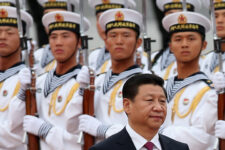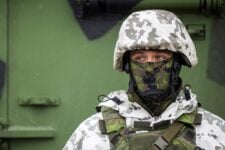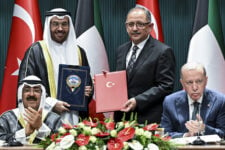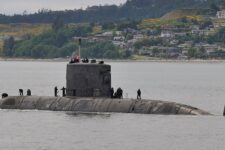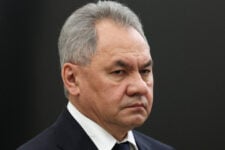
Honor guards prepare to raise the Taiwan flag in the Chiang Kai-shek Memorial Hall square. (Ulet Ifansasti/Getty Images)
SYDNEY and WASHINGTON: There’s been much gnashing of teeth about possible consequences from China over a long-discussed visit by US Speaker of the House Nancy Pelosi to Taiwan. With the visit now reportedly set for Tuesday evening local time, all eyes are turned to Beijing and what President Xi Jinping may do in response.
And while there has been a sense of impending doom in some quarters, there are also predictions that there is more sound than fury to come as a result of the visit, with experts noting the rhetoric coming from the People’s Republic is pretty standard fare and does not, in itself, signal a likely dangerous response.
When the speaker left for Asia on Sunday, her official itinerary included stops in Singapore, Malaysia, South Korea and Japan — with no mention of Taiwan, despite weeks of buildup and debate about whether a visit is a smart move or not. That in itself isn’t unusual; many visits by US lawmakers and policymakers to Taiwan occur without prior notice, in part to avoid a situation where China can use the ramp-up to try and prevent the visit.
But this visit has been anything but usual, given the leadup. In particular, those concerned about Beijing’s reaction point to the PRC’s readout of the telephone conversation between Xi and US President Joe Biden, which included vivid language for a diplomatic release: “Those who play with fire [on Taiwan] will perish by it.”
That comment was echoed again this week by China’s Foreign Ministry spokesman Zhao Lijian at a daily news briefing. “The will of the people cannot be defied, and those who play with fire will perish by it,” Zhao said Sunday. “It is believed the US side is fully aware of China’s strong and clear message.”
China, he said, is closely following Pelosi’s itinerary. And Zhao restated the usual Chinese language that her “visit to Taiwan by her would constitute a gross interference in China’s internal affairs, seriously undermine China’s sovereignty and territorial integrity, wantonly trample on the one-China principle, greatly threaten peace and stability across the Taiwan Strait, severely undermine China-U.S. relations, and lead to a very serious situation and grave consequences.”
It’s attention-grabbing stuff, but as Meia Nouwens of the International Institute for Strategic Studies, noted in an email, China had used virtually the same language and imagery in late May.
“’Fire’ isn’t new language, and therefore not escalatory,” she wrote. “Chinese have used it before, more recently in May 2022 after Biden made his comments about defending Taiwan.” Overall, Nouwens said the US and China simply “reiterated their positions.”
But with the final news that Pelosi would actually visit, Nouwens added that the huge amount of publicity means “Beijing will need to respond one way or another. Xi will have to show strength to his domestic audience. I don’t think this will escalate into a conflict, but I expect heightened military signaling by the PLA — just enough to show the level of discontent in Beijing about this visit, but not so much that it risks escalating across the conflict threshold.”
Dean Cheng, noted Chinese military analyst at Washington’s Heritage Foundation, echoed Nouwens, saying Xi’s comments were “not even that new a flourish.” However, he did say that “Beijing IS increasingly concerned that the US is about to change its position regarding Taiwan.”
John Kirby, coordinator for strategic communications at the National Security Council, took to CNN yesterday to try and calm the waters a bit. “There is no reason for the Chinese rhetoric,” Kirby said on CNN. “There is no reason for any actions to be taken. It is not uncommon for congressional leaders to travel to Taiwan. It is very much in keeping with our policy and consistent with our support to Taiwan under the Taiwan Relations Act.”
This from China's ambassador to the US. Today is the anniversary of the founding of the People's Liberation Army – another reason China is sensitive about Pelosi's visit since will occur 2 days after the PLA anniversary https://t.co/eXFcPkemQl
— Demetri (@Dimi) August 1, 2022
Kirby echoed recent comments by Gen. Mark Milley, chairman of the Joint Chiefs of Staff, noting the US military would provide whatever security and support the speaker might require. “I’m not going to talk about security requirements, but clearly we want to make sure that when she travels overseas, she can do so safely and securely, and we’re going to make sure of that,” Kirby said.
Of course, there have been both accidental and deliberate escalations in the past. The 2001 downing of a US Navy surveillance aircraft over China’s Hainan Island after a collision with a Chinese fighter, and the 1995-96 Taiwan Strait Crisis that began with China conducting missile tests to intimidate the island’s government. That ended when the United States Navy sent two aircraft carriers through the strait, a demonstration of raw power that deeply impressed the Chinese and helped spark their powerful efforts to field a useful fleet of aircraft carriers.
Notably, Kirby did indicated that China could launch a missile just as it did during the latter situation, telling reporters Monday that “these kinds of potential operations — military operations and exercises and missile launches that I talked about. I mean, what that does is it does increase the risk of miscalculation, as I said, which could lead to unintended consequences.”
One China Continues On
During the Monday briefing, Kirby again tried to downplay concerns from China that the trip would signify any major shift, saying “We have no interest, as I said in my opening statement, of increasing tensions here. We have no interest in changing any of the approach — approach that we take as a government or in keeping with our allies and partners to wanting to see cross-Strait tensions be resolved peacefully, without a unilateral change.”
At the heart of US-China tensions is the “One China” policy, a venerable agreement under which the United States acknowledges Beijing as the only legitimate Chinese government, while also supplying military equipment to Taiwan and insisting that any reunification across the Taiwan Strait must be peaceful and agreed upon by both sides. When asked at a May news conference whether he would be willing to use force to defend Taiwan, Biden seemed to abandon the strategic ambiguity at the core of the One China policy, replying that “Yes, that is the commitment we made.”
The White House quickly walked back Biden’s comments, insisting that the One China policy and its strategic ambiguity remain intact, pro-Taiwan politicians were quick to use the comments to push for greater security guarantees for the island democracy. It did not go unnoticed in Beijing.
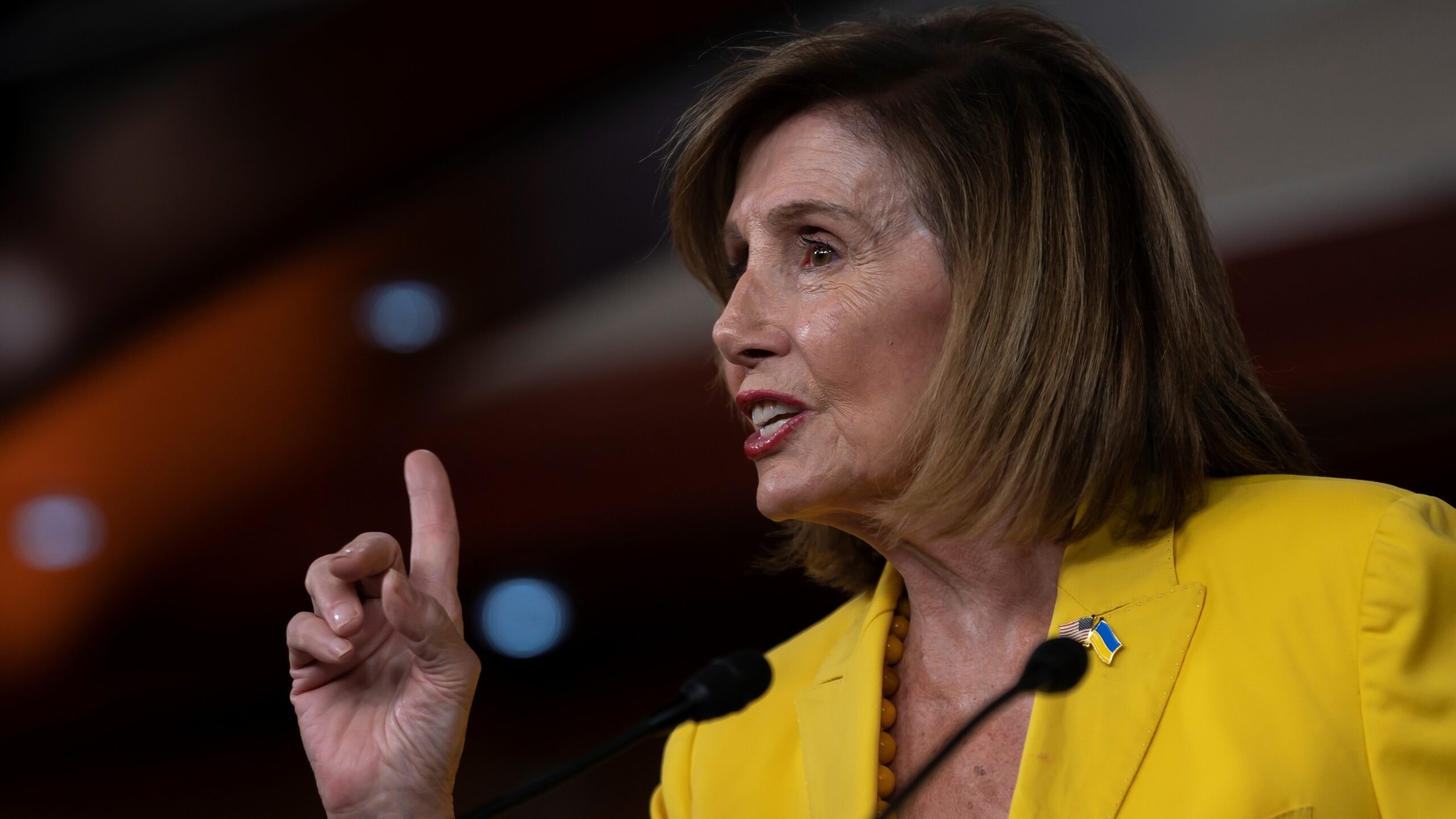
U.S. Speaker of the House Nancy Pelosi (D-CA) holds her weekly press conference at the U.S. Capitol on July 21, 2022. (Nathan Howard/Getty Images)
“Taiwan is the most sensitive and important core issue in China-US relations, and the United States is hollowing out and blurring the One China policy,” said Ambassador Qin Gang, China’s ambassador to the United States, speaking at the recent Aspen Security Forum. “The United States is substantially uplifting its official links with Taiwan. It is sending sophisticated weapons to Taiwan, and even at times saying that the United States would defend Taiwan militarily. So the One China principle that underpins China-US relations is under threat.”
Pelosi’s visit is happening at a sensitive time for Xi. The party leadership is meeting this week at a resort in advance of the party congress due to be held this fall. Xi has made “reunification” with the island state a keystone of his rule. Monday was the 95th anniversary of the founding of the Chinese Communist Party, and it’s worth remembering that the party is the supreme authority in China, not the state.
At the annual Aspen Forum last month, the question of China’s willingness to enter conflict over Taiwan was a major talking point.
“With China no longer achieving double digit [annual] economic growth, I’m really worried that Xi Jinping is committed to the great unification of the Chinese people as the basis for his legitimacy,” Stephen Hadley, former National Security Adviser for the Bush 43 administration, said at Aspen. “I think Xi is wedded to achieving that goal while still in office, and he’s convinced that reunification with Taiwan won’t happen peacefully.”
Xi may well take a lesson out of Russian President Vladimir Putin’s Ukraine playbook, Hadley said, starting with ongoing Chinese efforts to isolate and destabilize Taiwan and then bring it to heel by military means if necessary. “If you draw a straight line from current trends, I think we’re headed for a confrontation with China,” Hadley warned.
Former Defense Secretary Mark Esper, who recently met in Taiwan with its senior leadership, believes the United States should scrap the One China policy altogether, and clarify its security relationship with Taiwan. “The One China policy is now 50 years old, and I think it has run its course,” he said at Aspen. The policy speaks of publics on both sides of the Taiwan Strait believing that Taiwan is part of China, he noted, while today the majority of the people on the island identify as Taiwanese.
“China has also violated the understanding that it would not use coercion or military force to determine the final status of Taiwan,” said Esper, describing the island as a robust democracy with a thriving economy and a long-time security partner with the United States. “So if Speaker Pelosi wants to visit and the Taiwan government thinks it’s appropriate, she should go. I don’t think we should allow Beijing to determine where senior American officials travel or don’t travel.” China also recently unilaterally declared that the Taiwan Strait is no longer an international waterway, noted Esper, “So Beijing continues to try and unilaterally change international rules and norms to suit their own needs.”
China’s Ties To Russia A Consideration
Russia’s illegal war against Ukraine may also be something of a model for China as it deals with Taiwan. In February, on the eve of Russia’s invasion, Putin and Xi announced a strategic alliance and “friendship without limits.” Since then, Beijing has assisted Russia by buying its oil and rhetorically taking its side in the war, though US officials say that to date China has stopped short of supplying Moscow with additional weaponry for fear of running afoul of Western economic sanctions.
Regardless, the United States and its allies in Europe and Asia increasingly view the Ukraine War as a fulcrum in the long brewing confrontation between Western-style democracies and increasingly autocratic major powers led by Russia and China.
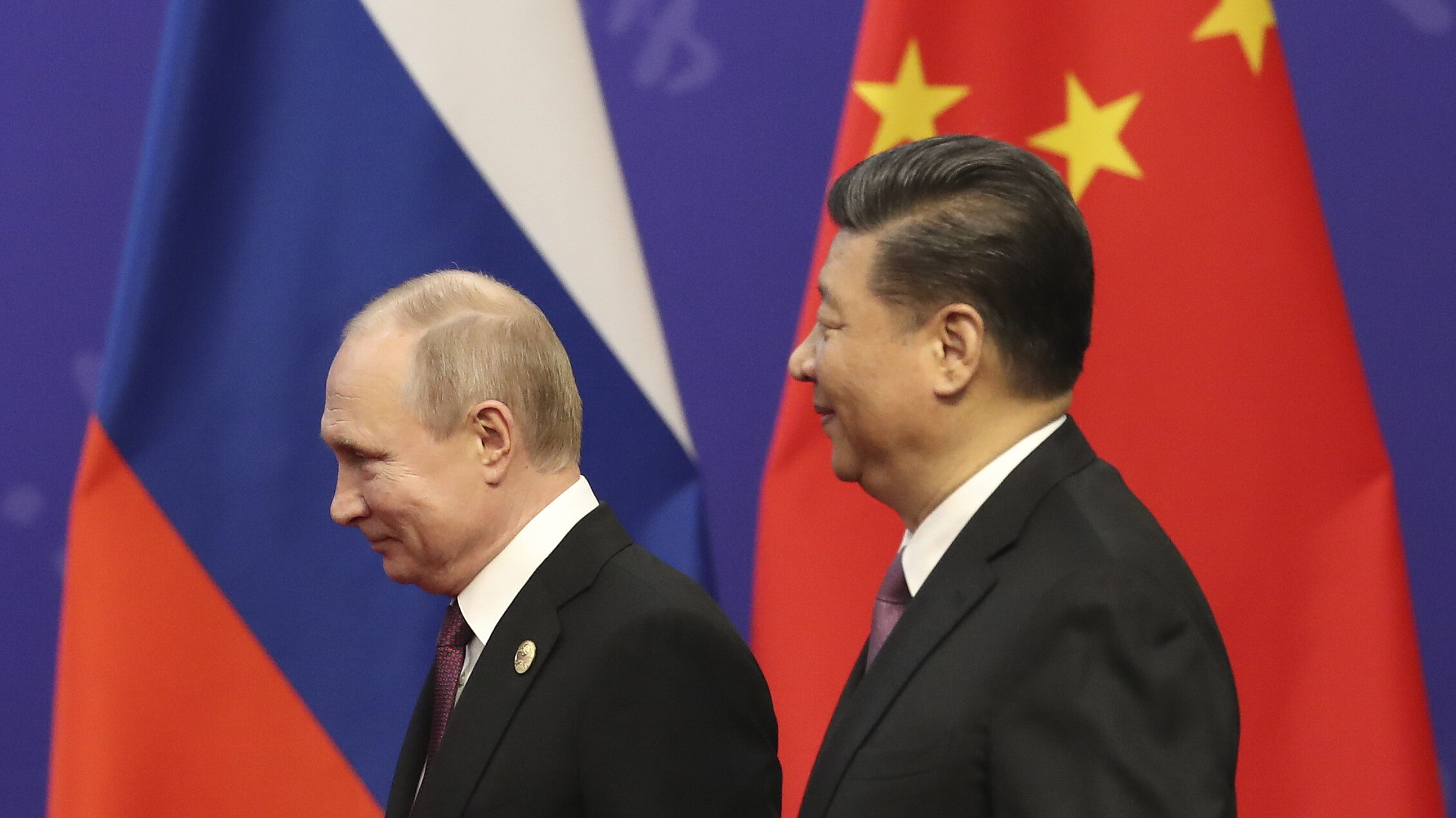
Russian President Vladimir Putin, left, and Chinese President Xi Jinping, right, attend the Tsinghua University, before the meeting, at Friendship Palace on April 26, 2019 in Beijing, China. (Photo by Kenzaburo Fukuhara – Pool/Getty Images)
“There is no question that the Chinese are watching the Ukraine War and studying it with a fine tooth comb,” Victoria Nuland, Undersecretary of State for Political Affairs and the number three official at the State Department, said during Aspen. “They are studying it in terms of the military tactics Ukraine has used to defend itself, and Russia’s mistakes, and the economic unity the West has displayed against Russia with sanctions. They are studying the entire United States’ playbook in Ukraine that potentially China would have to worry about in a Taiwan scenario.”
But US officials believe Xi and the Chinese Communist Party leadership are actually worried by what they’ve seen in Ukraine — the poor performance of the Russian military and weaponry, and the fact that Putin’s invasion has increased the cohesion or NATO and tightened relations between Europe and the United States, as well as its democratic allies in Asia and the Indo-Pacific.
“For all those reasons I think the Chinese are a bit unsettled by the Ukraine War, but I still wouldn’t underestimate President Xi’s determination to assert China’s control over Taiwan,” said CIA Director William Burns at Aspen. Intelligence analysts believe Putin’s experience in Ukraine is probably not going to deter China from using force against Taiwan, but it may affect how and when they decide to act.
“I suspect the lesson China is drawing is that [in a Taiwan invasion scenario] it has to amass overwhelming force, control the information space, shore up its economy against potential Western sanctions, and do everything possible to drive a wedge between the United States and its allies in the Indo-Pacific region,” said Burns. “So I think Xi is still determined to ensure that he has the capabilities to undertake such an action against Taiwan if he chooses to move in that direction, and the risks of him actually doing that become higher the further into this decade we travel.”

